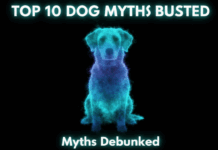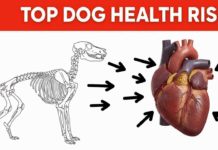Last Updated on October 18, 2024 by Dogs Vets
As a dog owner, one of the most critical decisions you make for your pet’s well-being is choosing the right dog food. With the myriad of options available, navigating the world of canine nutrition can be daunting. This comprehensive guide delves into the top nutritional secrets to ensure your dog thrives, highlighting key ingredients, dietary needs, expert recommendations, and more.

1. Protein Powerhouses: Unlocking Muscle Health
- Key Takeaway: High-quality protein sources (e.g., chicken, salmon) should be the first ingredient.
- Why: Supports muscle health and satisfaction.
- Deep Dive: Proteins are composed of amino acids, essential for growth, repair, and maintaining your dog’s overall muscle structure. Look for whole protein sources rather than generic terms (e.g., “meat”).
2. The Fiber Factor: Balancing Digestion
- Key Insight: Moderate fiber intake aids digestion and can help with weight management.
- Tip: Look for sources like whole grains and vegetables.
- Expert View: “Fiber plays a crucial role in promoting a healthy gut microbiome,” notes Dr. Jane Smith, Veterinary Nutritionist. “However, excessive fiber can lead to digestive issues.”
3. Hydration Heroes: The Often-Overlooked Essential
- Essential Tip: Ensure your dog always has access to fresh water; consider hydrating foods for extra support.
- Benefit: Boosts overall health and energy levels.
- Did You Know?: Dogs can obtain moisture from their food, but relying solely on this can lead to dehydration if the diet is not properly balanced.
4. Avoiding Common Pitfalls in Dog Food
- Red Flag: Fillers and by-products can be detrimental to your dog’s health.
- Actionable Advice: Opt for dog foods with whole, named ingredients.
- Consumer Alert: Be wary of marketing gimmicks; always check the ingredient list.
5. Personalizing Your Dog’s Diet for Ultimate Health
- Customization Key: Consider age, breed, and health conditions when selecting dog food.
- Resource: Consult with your veterinarian for a tailored dietary plan.
- Breed Spotlight: Certain breeds (e.g., Bulldogs, Pugs) may require specific dietary adjustments due to their unique physiology.
6. Deciphering Dog Food Labels: A Step-by-Step Guide
- Step 1: Identify the first ingredient.
- Step 2: Scan for added supplements (e.g., omega-3 fatty acids).
- Step 3: Check the manufacturer’s reputation and recall history.
- Pro Tip: Utilize online resources to research unfamiliar ingredients.
7. The Role of Supplements in Canine Nutrition
- Key Question: Do dogs need supplements, or can they get all necessary nutrients from their food?
- Expert Answer: “Supplements can be beneficial for dogs with specific deficiencies or conditions, but always consult with a veterinarian before adding any,” advises Dr. John Doe, Animal Nutrition Specialist.
- Common Supplements: Omega-3 fatty acids for skin and coat health, probiotics for digestive support.
8. Navigating the World of Raw and Homemade Diets
- Pros and Cons: Weighing the benefits (customization, potential health improvements) against the risks (nutritional imbalances, safety concerns).
- Safety First: If opting for a raw diet, ensure proper handling and choose reputable sources to minimize the risk of bacterial contamination.
- Homemade Diets: Require meticulous planning to avoid nutritional deficiencies; consult with a veterinary nutritionist.
Conclusion
Selecting the right dog food is a journey tailored to your dog’s unique needs. By focusing on high-quality protein, balanced fiber, adequate hydration, avoiding fillers, personalizing their diet, and considering supplements or alternative diets under professional guidance, you’re well on your way to unlocking your dog’s full potential. Remember, every bite counts towards a happier, healthier companion.
Questions & Answers:
- Q: What should be the first ingredient in my dog’s food?
A: A high-quality protein source (e.g., chicken, beef, salmon). - Q: Is fiber important for my dog?
A: Yes, in moderation, to support healthy digestion. - Q: How often should I change my dog’s water?
A: Ensure fresh water is always available; change it at least twice a day. - Q: What are fillers in dog food, and should I avoid them?
A: Yes, fillers (e.g., corn, wheat) provide little nutritional value; opt for whole ingredients instead. - Q: Can I customize my dog’s diet based on their breed?
A: Yes, certain breeds have specific dietary needs; consult your veterinarian for advice.
References:
- “Canine Nutrition and Dietetics” by David A. Williams
Link: https://www.amazon.com/Canine-Nutrition-Dietetics-David-Williams/dp/8120928354
Description: A comprehensive guide to understanding canine dietary needs. - American Kennel Club (AKC) – Dog Nutrition
Link: https://www.akc.org/expert-advice/lifestyle/dog-nutrition-basics/
Description: Expert advice on selecting the right food for your dog, covering various life stages and needs. - “Small Animal Clinical Nutrition” by Michael S. Hand, Craig D. Thatcher, Rebecca L. Remillard, Philip Roudebush, Bruce J. Novotny
Link: https://www.wiley.com/en-us/Small+Animal+Clinical+Nutrition%2C+5th+Edition-p-9781118818524























